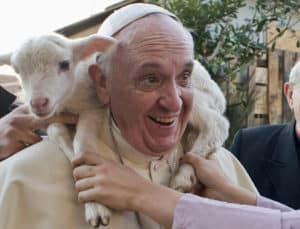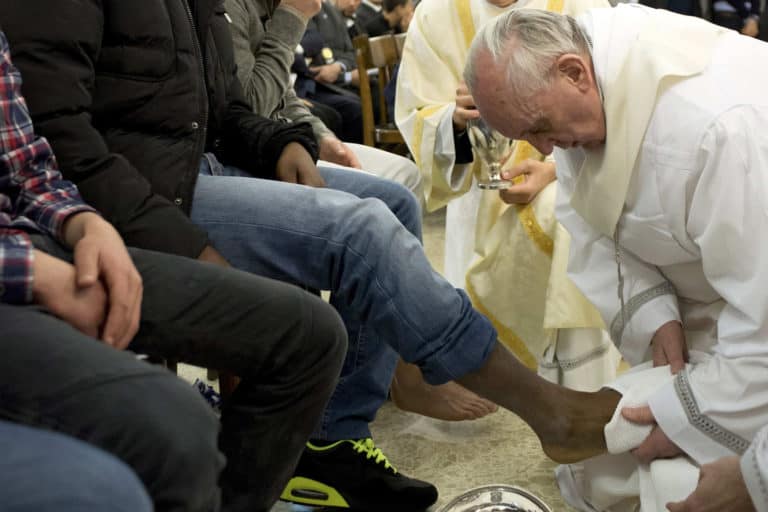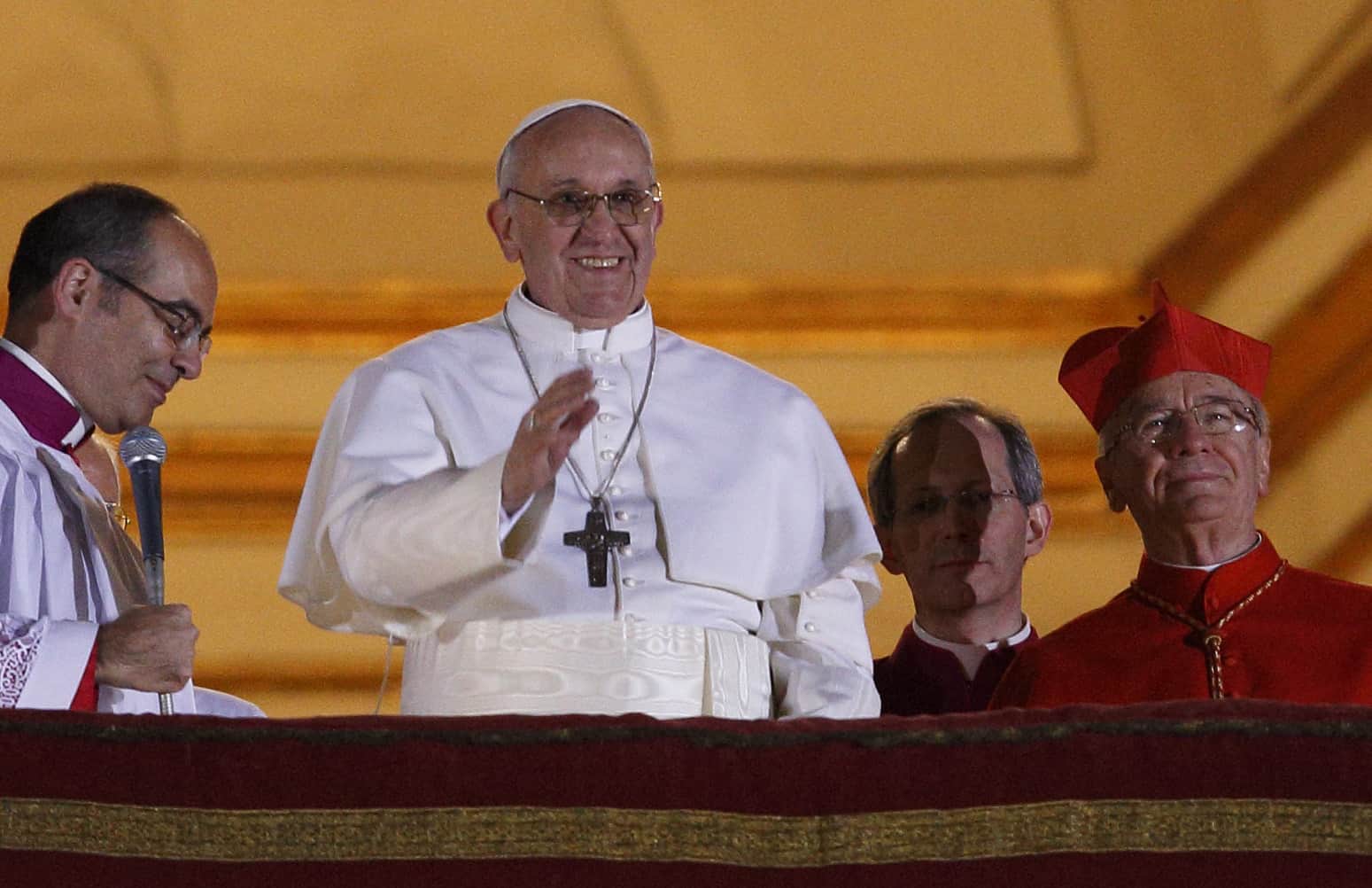Much has been written of Pope Francis’ past five years as pope. But what will his future look like? Here I consider the Church’s image; Church teaching; and institutional reforms.
Popular Perceptions of the Church
There can be no question that Pope Francis has done a great deal to improve the popular image of the Church. And Francis himself remains tremendously popular. As I have argued recently, Pope Francis’ popularity stems from a deep hunger for good, moral leaders.

(CNS photo/L’Osservatore Romano via Reuters)
But the honeymoon is over, as a major Pew study notes. While Pope Francis enjoys consistently high support among U.S. Catholics across the ideological spectrum, his support among political conservatives has declined.
This decline in support was perhaps inevitable: public figures often start out with high approval ratings that eventually come down to earth. But given that one of Pope Francis’ greatest gifts is his ability to reach people directly, one hopes that he will be attentive to this asymmetry in support – even as he juggles ten thousand other concerns.1
But Pope Francis’ popularity will not alone fix the problems ailing the Church. Mass attendance continues its downward trend in the U.S., for instance. And, however beloved Pope Francis may be, the Catholic Church around the world continues to suffer tremendously from the loss of credibility sustained by the clerical sex abuse. Indeed, even Pope Francis cannot avoid that stain, as we saw recently in Chile.
But these are hardly problems that the pope can solve on his own. It remains to be seen, therefore, how Pope Francis’ example will inspire other Catholics to follow his lead.
Church Teaching
A hundred years from now, Pope Francis may well be best-remembered for Amoris Laetitia. But in the midst of the controversies it has sparked about reception of Communion by divorced and remarried Catholics, one can easily forget that Pope Francis has strengthened the Magisterium on issues of ecology with Laudato si’. He has also been a doctor of mercy, a constant theme of his teaching. Perhaps the controversy over Amoris Laetitia suggests ways in which his teaching on mercy requires deeper reception and further clarification.
Three issues loom for Francis. First, the issue of married priests. While Pope Francis has indicated no change to clerical celibacy, many reports circulate that married priests will be a subject at the 2019 synod on the Amazon – and that Pope Francis authorized that discussion. If the synod’s proposals for married priests gain traction with Francis, one wonders if bishops in other priest-poor places will also start to explore this idea.
Second, just peace. People of all stripes have been clamoring for some time for a definitive statement from Pope Francis on peace and violence. Indeed, there has been talk of him replacing “just war” language with “just peace” theory. While Pope Francis is unlikely to jettison any ancient line of Catholic thought, he clearly takes issues of peace very seriously. Look, therefore, for Francis to say something here.
Finally, China. What will come of the Holy See’s attempt at rapprochement with China? Will this peace-making alleviate a very difficult situation for Catholics in China? There is no certain answer to this, as the Chinese Communist Party is one of the most opaque governance structures in the world, and President Xi is building an autocracy with resources far outstripping those of Vladimir Putin.
While not strictly a doctrinal issue, the Vatican’s relations with China raise practical questions about the freedom of the Church. For this episode to end well, Pope Francis might need to commit personally his considerable diplomatic skills. Could he even go to China?

(CNS photo/L’Osservatore Romano via Reuters)
Institutional Reform
Many agree that Pope Francis will not accomplish all that had been hoped when he was elected. What should be his priorities looking forward? I will suggest three.
First, reform for clerical sex abuse of minors. Pope Francis created a stir in January with his seemingly cavalier dismissal of accusations against a Chilean churchman. Even Seán Cardinal O’Malley, Francis’ most prudent interpreter this side of the Atlantic, went so far as to venture that Pope Francis’ words in Chile were a “source of great pain for survivors of sexual abuse.”
Regional tribunals are a start: they might decentralize and therefore expedite the processing of sex abuse claims. But great care would have to be taken to ensure their fairness.
Further, as Reese argues, the fundamental problem in the Barros case is that there are no procedures in place for handling such claims against bishops. Regional tribunals will not fix that problem.
But this takes us back to the most mystifying part: why has Pope Francis been so lukewarm about this reform? While there is no doubt that he deeply cares about the injuries that so many priests have done against children in the name of God, his actions have not always matched that concern. Most notably, he allowed the Commission on for the Protection of Minors to lapse, although it now seems to be back in full swing.
Look, then, for an increasingly resolute attitude – and a more serious institutional commitment – from Pope Francis on this issue.
Second, the Secretariat of the Economy. Financial transparency has been a source of genuine progress in the Holy See, but recent events have reminded us of just how fragile that progress is. George Cardinal Pell, head of the Secretariat, has been called back to Australia to face charges. But he had been sidelined long before then.
The Secretariat of State, meanwhile, has grown rather than waned in power, and in part at the expense of the Secretariat of the Economy. That growth might be useful in the short run: it reflects Pope Francis’ trust in the Secretary of State, Cardinal Parolin, who is earning high marks from everyone after the uneven years of Cardinal Bertone. In the long run, however, it risks the Secretariat of State absorbing all the power that Pope Francis is wrestling from other Vatican dicasteries.
In the coming years, then, the Secretariat of the Economy can serve as a canary in the coal mine: whether Pope Francis can move forward with institutional reforms on his own terms.
Third, the Synod of Bishops. Pope Francis has renewed Vatican II’s emphasis on incorporating the bishops into papal governance, often invoking “synodality” and “collegiality.” Will bishops’ synods become places where bishops speak freely and genuinely contribute to Church governance? While much controversy on that very question surrounded the 2014-15 synods, this fall’s Synod on Young People will grant us another opportunity to see Pope Francis’ hopes for synodality in action.
Beyond the synods, will Pope Francis take additional actions to encourage collegial governance? Given Pope Francis’ positive experiences of episcopal cooperation as archbishop, such as at Aparecida, his agenda on this topic could contain yet more surprises.
***
This list could have included many other things. I would love readers to share: what do you hope to see in Pope Francis’ next five years?
- Perhaps more relevantly for this website and many of its readers, this data offers a challenge to Pope Francis’ advocates: can they engage Catholics disaffected from the Francis pontificate in ways that draw the Church closer together? Doing so will require that we be willing to learn from others. ↩


